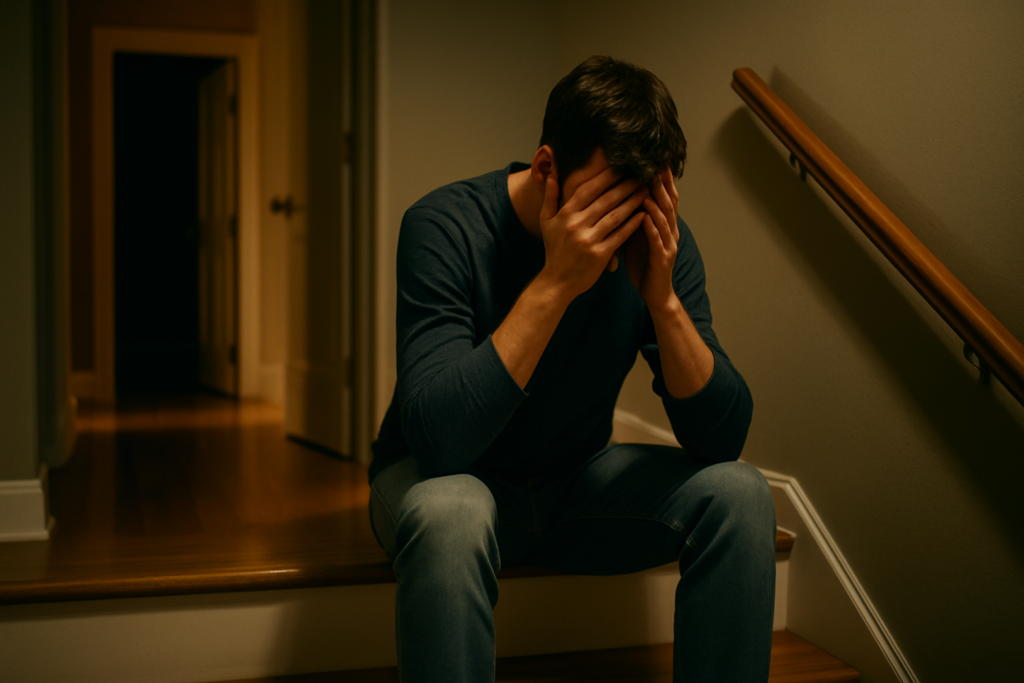“Your authority doesn’t weaken when you say ‘I’m sorry.’ It deepens.”
The Moment I Lost It
A couple weeks ago, my wife went on a well-earned vacation with her mom to celebrate her 70th birthday—leaving me flying solo with the kids for two weeks.
At first, I was feeling pretty good about it. Work? Handled. Meals? Cooked. School drop-offs and sports practices? Crushed it. I was basically one cargo short of being a full-fledged minivan Uber with unpaid overtime.
Then came bedtime.
It was 9:30 PM. I’d been up since 5:00 AM for an early work call, made three meals, helped with homework, and drove all over town for activities. My energy tank wasn’t just low—it had been on E for hours.
The boys were supposed to be asleep. Instead, it sounded like they were auditioning for an Olympic wrestling team upstairs.
“Guys! Bedtime! NOW!” I yelled—for maybe the tenth time.
Silence.
Then giggles.
Then the unmistakable thud of someone turning a bunk bed into a trampoline.
I stomped up the stairs, already feeling that dangerous heat rising in my chest. When I opened the door, I saw pillows flying, blankets on the floor, and both boys mid-air in what looked like a synchronized cannonball.
And I lost it.
Not in the “firm dad voice” way. I mean really lost it.
The yelling that came out of me wasn’t just, “Time for bed.” It was the full thunderstorm of built-up stress:
“What is WRONG with you two?”
“I’m DONE being nice about this!”
“Why can’t you just LISTEN?!”
My voice was somewhere between drill sergeant and malfunctioning fire alarm.
When I finally stopped, the room fell silent. My youngest had tears in his eyes. My oldest looked like he was trying hard not to show he was hurt.
I shut the door and walked downstairs. The guilt hit before I hit the last step.
Then came the question: Do I apologize… or does that just teach them they can walk all over me?
Spoiler: I apologized. And it didn’t make me weak. It made everything better.
The Cultural Lie: “Never Let Them See You Weak”
Many of us grew up with this unspoken rule: being a strong dad means never admitting you’re wrong. Never backing down. Never apologizing—especially to your kids.
We’re told, “If they see your weakness, they’ll stop respecting you.”
But I’ve learned—sometimes painfully—that real strength isn’t about never messing up. It’s about owning it when you do.
True leadership isn’t about always being right—it’s about doing what’s right after you were wrong.
And here’s the thing: research backs this up. A study published in Developmental Psychology found that children whose parents admit mistakes and make repairs show higher emotional intelligence, stronger problem-solving skills, and better long-term trust in relationships.
Translation? Apologizing to your kids actually helps them grow.
✅ Takeaway: Strength in fatherhood isn’t about never messing up—it’s about owning your mistakes and modeling repair.
Why Apologizing Matters So Much
When I talk to other dads about apologizing to their kids, I sometimes get the raised eyebrow. The “You okay, man?” look.
But here’s what I’ve found:
1. You’re modeling humility.
Kids don’t do what we say. They do what they see. If they never see us own our mess-ups, how will they learn to own theirs?
2. You’re repairing emotional damage.
Every blow-up creates a tear in the connection. An apology is the thread that stitches it back together.
3. You’re creating safety.
Home should be the safest place in the world to mess up—and still be loved. Apologizing shows them it’s okay to be imperfect.
✅ Takeaway: Apologizing builds humility, repairs relationships, and helps your kids feel emotionally safe.
What Makes a Good Apology (And What Doesn’t)
Not all apologies are created equal. Some are more like PR statements than heartfelt repairs.
Apologies that DON’T work:
- “I’m sorry, but you shouldn’t have been jumping on the bed.”
- “I’m sorry you feel that way.”
- “I shouldn’t have yelled, but I warned you five times.”
Translation: I’m sorry… that you made me act that way.
Apologies that DO work:
- “I lost my temper. That’s on me. You didn’t deserve that.”
- “I’m working on being more patient. Thanks for sticking with me while I figure it out.”
- “My reaction wasn’t okay. I could’ve handled that better.”
A good apology owns your behavior with no qualifiers. No “but.” No blame shift. Just responsibility.
✅ Takeaway: Apologize without placing blame. Drop the “but” and own your part.
Age-Appropriate Apologies
One thing I’ve noticed: how I apologize has to shift depending on which kid I’m talking to. What works for my youngest definitely doesn’t fly with my oldest. I’m still learning this—usually the hard way.
With my five year old…
I try to keep it simple. Eye level. Calm voice. Fewer words. And always a hug.
Something like:
“Daddy used his big voice. That was scary. I’m sorry. I love you.”
Honestly, I think the hug does most of the heavy lifting.
With my elementary-aged kids…
They’re old enough to pick up on the tone behind the words, so I try to be specific. If I said something unkind or impatient, I name it. It’s not easy, but I’ve seen how much they soften when they realize I actually see them.
“I called your project messy. That wasn’t kind. You worked hard—I should’ve seen that first.”
Sometimes they want to talk. Sometimes they don’t. But I always try to leave the door open.
With my teen (or close enough)…
This is where it gets trickier. They’re allergic to fake. If I sound like I’m trying to manage them instead of respect them, they shut down. So I’ve found that being honest, direct, and not over-explaining seems to go further.
“You were right to walk away. I was sarcastic and out of line. I’m working on that.”
And when it feels right, I’ll ask:
“What would’ve helped in that moment?”
Not to defend myself—but to understand how I can do better next time. When they answer (and sometimes they do), I try to really listen—even if it stings a bit.
✅ Takeaway: Tailor your apology to your child’s age—simplicity, specificity, and respect go a long way.
What Happens When You Don’t Apologize
When we skip the apology, intentionally or not, here’s what our kids may come to believe:
- Mistakes should be hidden, not owned.
- Being right matters more than being connected.
- Parents don’t have to play by the same rules.
It quietly teaches that the relationship only works one way—and that’s a heavy message for a kid to carry.
✅ Takeaway: Skipping the apology teaches kids to hide mistakes and question emotional safety.
What Happens When You Do
The morning after my blow-up, I sat the boys down and said:
“Last night, I handled things badly. You weren’t listening, and that was frustrating—but the way I yelled and what I said wasn’t okay. I’m working on being calmer, even when I’m tired. You deserve better from me.”
My youngest hugged me. My oldest nodded. Then I said something I’m glad I did:
“I appreciate you owning your part—but my behavior is mine to own, no matter what.”
Bedtime went smoother that night. Not because they feared another blow-up, but because we’d cleared the air. We’d repaired the rupture.
And yes—it actually deepened the respect.
✅ Takeaway: A sincere apology rebuilds trust and shows your kids that respect and accountability go both ways.
Focused Practice: Try This This Week
If this hits close to home, here’s something to try:
- Reflect: Was there a moment this week you mishandled? Write it down.
- Own it: Tell your kid exactly what you did wrong. Keep it short. No excuses.
- Repair: Ask, “How did that feel?” or “What do you need from me next time?”
Then listen. Like, really listen. No follow-up TED Talk needed.
✅ Takeaway: Reflect, own, and repair—then listen without trying to fix.
The Strongest Fathers Say “I’m Sorry”
I’m still learning this. Still blowing it sometimes. Still circling back.
Just last week, I interrupted my son mid-story because I was distracted by a work email. I caught it and apologized on the spot.
He smiled and said, “It’s cool, Dad,” and picked the story right back up.
That moment reminded me: our kids don’t need us to be perfect.
They need us to be real.
And sometimes, the most powerful thing a father can say isn’t a rule or a lecture.
It’s: “I’m sorry.”
And then showing them, over time, that you meant it.
✅ Takeaway: Your kids don’t need you to be perfect—they need you to be real and willing to repair.
The Focused Fool Newsletter – Growing as Men. Leading as Fathers.
This article is part of our ongoing series on emotional intelligence in fatherhood. Have thoughts to share? Join the conversation in our community forum.


Leave a Reply